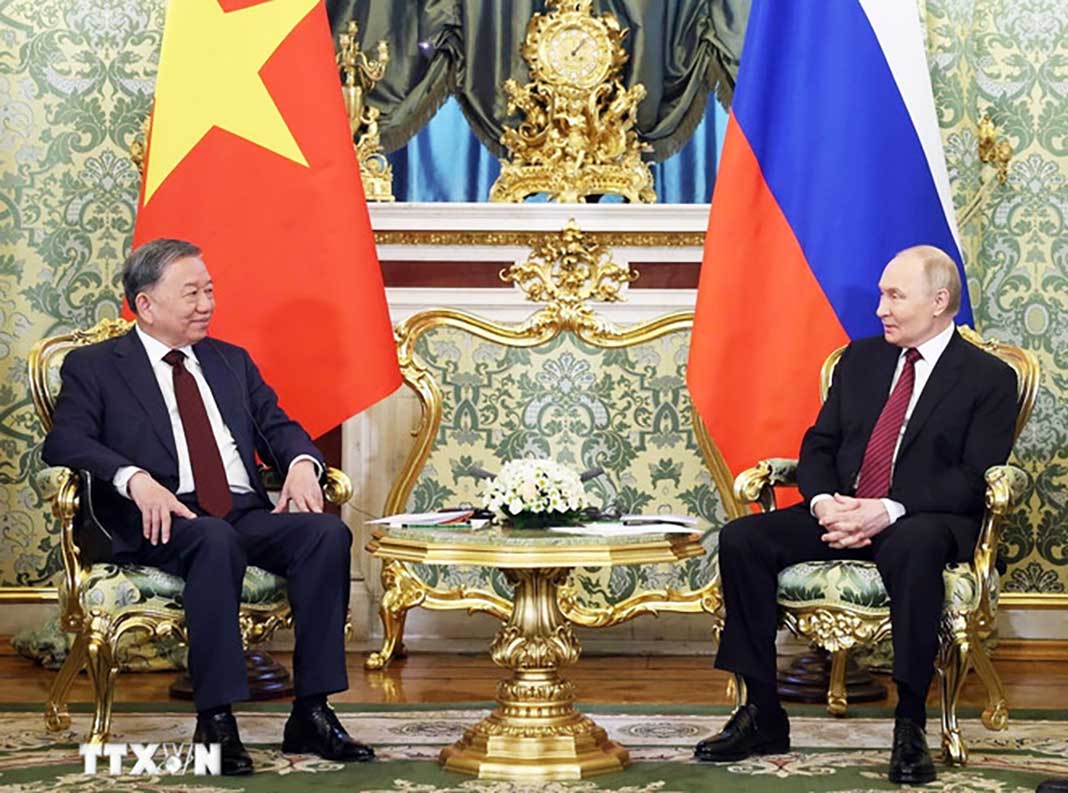HCMC – Vietnam and Russia have mapped out a comprehensive roadmap to deepen their Comprehensive Strategic Partnership, emphasizing enhanced cooperation in defense, trade, energy, and technology.
Following an official visit to Moscow from May 8-11 by Vietnam’s Party General Secretary To Lam, the two nations issued a joint statement which provides specific steps to elevate bilateral ties to new heights.
The visit at the invitation of Russian President Vladimir Putin coincided with the 80th anniversary of Russia’s victory in Great Patriotic War and marked a significant milestone in the 75-year diplomatic relationship between the two nations. It also aligned with key anniversaries, including 50 years since the liberation of southern Vietnam and the reunification of the nation and 80 years of Vietnam’s independence.
During the visit, General Secretary To Lam held talks with President Putin and met with key Russian officials, including Prime Minister Mikhail Mishustin, Federation Council Chairperson Valentina Matviyenko, and State Duma Chairman Vyacheslav Volodin. The discussions, conducted in a spirit of traditional friendship and trust, focused on elevating bilateral ties to new heights.
Both sides reaffirmed defense and security as a cornerstone of their Comprehensive Strategic Partnership. They pledged to enhance cooperation in these areas with high trust and efficiency, ensuring alignment with international law and regional stability.
Economic cooperation emerged as a key focus, with both nations committing to leverage opportunities under the Vietnam-Eurasian Economic Union Free Trade Agreement to balance trade and diversify exports. A comprehensive plan to boost economic, trade, and investment ties by 2030 was endorsed, with emphasis on removing technical barriers and fostering direct business contacts.
Investment diversification was a recurring theme, with Vietnam encouraging Russian ventures in its energy, industrial, and agricultural sectors, while Russian firms were invited to explore opportunities in Vietnam’s mineral mining and processing and digital transformation initiatives.
Energy cooperation, a hallmark of Vietnam-Russia ties, will see further expansion. Both countries agreed to optimize existing oil and gas projects, such as the Vietsovpetro and Rusvietpetro joint ventures, and explore new initiatives, including Russia’s supply of crude oil and liquefied natural gas to Vietnam. Plans for modernizing power facilities and advancing renewable energy were also discussed.
A significant commitment was made to accelerate the construction of a Center for Nuclear Science and Technology in Vietnam, alongside training Vietnamese students in Russia for peaceful nuclear energy applications. Negotiations for intergovernmental agreements on nuclear power plant construction, prioritizing advanced technology and safety, are set to commence urgently.
In a bid to foster innovation, both nations designated 2026 as the Year of Scientific and Educational Cooperation. The Joint Vietnam-Russia Tropical Center will receive enhanced support to elevate its research capabilities to regional and international standards. The transfer of the research vessel “Professor Gagarinsky” to Vietnam and technology transfers within the center’s framework were also welcomed.
Educational ties will be strengthened through expanded university networks and increased Russian scholarships for Vietnamese students in critical economic fields. Cultural initiatives include establishing a Vietnamese Cultural Center in Russia, reorganizing the Pushkin Russian Language Institute into a joint educational center, and promoting tourism through simplified travel procedures and more direct flights.
On the international stage, Vietnam and Russia vowed to advocate for a multipolar world order based on fairness and mutual respect, opposing unilateral sanctions not endorsed by the U.N. Security Council. They expressed support for ASEAN’s central role in the Asia-Pacific and endorsed peaceful resolutions to disputes, including in the East Sea, in line with the 1982 U.N. Convention on the Law of the Sea.
Russia commended Vietnam’s balanced and objective stance on the Russia-Ukraine conflict and welcomed its willingness to contribute to peaceful resolutions. Both nations committed to deepening cooperation within multilateral frameworks like the United Nations, APEC, and ASEAN-led mechanisms, with a focus on countering terrorism, climate change, and cybersecurity threats.









